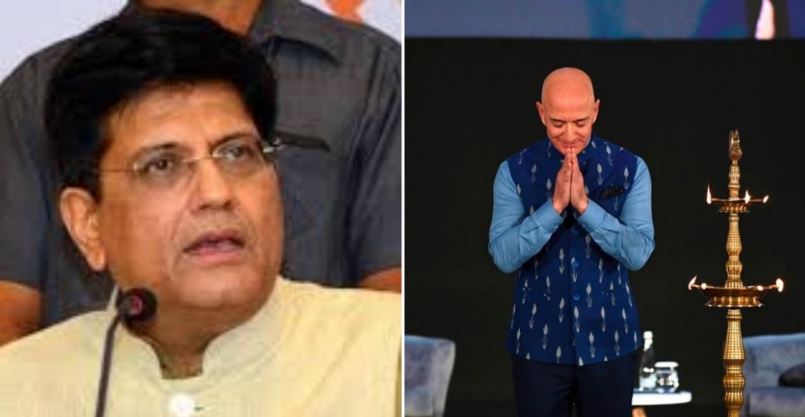Jeff Bezos’ three-day visit to India has turned out to be a real disaster as the world’s richest man continues to draw fire in India. Bezos’ Amazon is facing a Competition Commission of India (CCI) probe into allegations of competition law violations. Bezos also initiated a major PR exercise by announcing an investment of $1 billion towards digitizing small and medium businesses across India.
However, his PR exercise has failed to yield a positive response, even as Union Commerce and Industry Minister, Piyush Goyal has made it clear that the Amazon founder & CEO, Bezos is not doing a favour to India with the US $ 1 billion investment. Goyal also questioned how the e-commerce major could incur “big” losses but for predatory pricing.
Amazon is infamous for offering impossibly high rates of discount, sometimes below the cost price, throwing competing retailers out of business. This has led to allegations of predatory pricing against the e-commerce giant.
Speaking at an event in the National Capital, the Union Minister said, “They [Amazon] may have put in a billion dollars but if they make a loss of a billion dollars every year, then jolly well will have to finance that billion-dollar. So, it is not as if they are doing a favour to India when they invest a billion dollars.”
Goyal who has not yet held a meeting with the Amazon founder despite initial speculations of a possible meeting between the two has also said, “They are investing money over the last few years also in warehousing and certain other activities, which is welcome and good. But if they are bringing in money largely to finance losses and those losses in an e-commerce market place model.”
Goyal added that if in a fair market place model in a turnover of $10 billion, a company is incurring losses to the tune of billions of dollars, then it “certainly raises questions, where the loss came from”.
Goyal has also made it clear that the Indian position on FDI in multi-brand retail trading is quite strict and anyone who tries to use the e-commerce market place model for surreptitiously entering into multi-brand retail, then it will have to be questioned and investigated.
It is important to mention in this context that Amazon’s policy of “preferred sellers” has also emerged as a murky and suspicious. There is no clarity as to the criteria for selecting preferred sellers. Such preferred sellers resort to deep discounting which sometimes borders on predatory pricing. There are also allegations of the “preferred sellers” being affiliated with or substantially controlled by Amazon. Such affiliation could be a violation of the 49 per cent cap on FDI in multi-brand retail.
As such, India is not averse or opposed to welcoming investments. However, the Modi government has made it clear that it is about India enforcing its rules. No exception is made out even for a business giant, and the country holds every right to express displeasure when a business major tries to find loopholes in order to game the system or make an outright contravention of the law of the land.
